| Article ID | Journal | Published Year | Pages | File Type |
|---|---|---|---|---|
| 2024559 | Soil Biology and Biochemistry | 2015 | 8 Pages |
•AMF field inoculation increased wheat dry weight, P, N and Zn uptake.•AMF inoculation increased wheat grain yield by 20% and harvest index by 25%.•Grain yield of wheat was positively related to root colonization (RC) by AMF.•P and Zn concentration in grain were positively correlated to RC by indigenous AMF.•Soil organic matter and soil pH were the most important parameters affecting wheat response to AMF.
Arbuscular mycorrhizal fungi (AMF) can benefit growth and yield of agriculturally significant crops by increasing mineral nutrient uptake, disease resistance and drought tolerance of plants. We conducted a meta-analysis of 38 published field trials with 333 observations to determine the effects of inoculation and root colonization by inoculated and non-inoculated (resident) AMF on P, N and Zn uptake, growth and grain yield of wheat. Field AMF inoculation increased aboveground biomass, grain yield, harvest index, aboveground biomass P concentration and content, straw P content, aboveground biomass N concentration and content, grain N content and grain Zn concentration. Grain yield was positively correlated with root AMF colonization rate, whereas straw biomass was negatively correlated. The most important drivers of wheat growth response to AMF were organic matter concentration, pH, total N and available P concentration, and texture of soil, as well as climate and the AMF species inoculated. Analysis showed that AMF inoculation of wheat in field conditions can be an effective agronomic practice, although its economic profitability should still be addressed for large-scale applications in sustainable cropping systems.
